Text
Harnessing the Sun: A Journey into the World of Solar Power Systems
Introduction:
In a world where sustainability and renewable energy are increasingly becoming priorities, solar power systems have emerged as a beacon of hope for a brighter, cleaner future. Harnessing the abundant energy of the sun, these systems offer a sustainable alternative to traditional fossil fuel-based electricity generation. Join us on a journey as we explore the fascinating world of solar power systems and discover how they are revolutionizing the way we power our lives.

The Power of the Sun: At the heart of every solar power system lies the incredible power of the sun. Unlike finite fossil fuels, solar energy is abundant, renewable, and environmentally friendly. By capturing sunlight using photovoltaic (PV) panels, solar power systems convert this energy into electricity, providing a clean and sustainable source of power for homes, businesses, and communities.
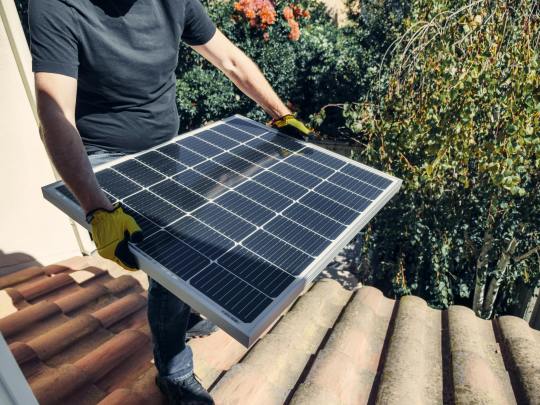
How Solar Power Systems Work: Solar power systems consist of several components working together to harness and convert sunlight into usable electricity. PV panels, typically mounted on rooftops or ground-mounted arrays, contain solar cells that capture sunlight and convert it into direct current (DC) electricity. This electricity is then passed through an inverter, which converts it into alternating current (AC) electricity suitable for powering household appliances and electronics. Excess energy can be stored in batteries for use during periods of low sunlight or exported to the grid for credit.

Benefits of Solar Power Systems: The benefits of solar power systems are manifold, extending beyond environmental considerations to encompass financial savings, energy independence, and resilience. By generating electricity from sunlight, solar power systems reduce reliance on fossil fuels, helping to mitigate climate change and reduce air pollution. Additionally, homeowners and businesses can enjoy significant savings on their electricity bills by generating their own clean energy. Solar power systems also offer energy independence, providing a reliable source of electricity even in remote or off-grid locations. Moreover, solar energy is abundant and inexhaustible, ensuring long-term energy security and resilience in the face of energy crises or disruptions.

Embracing a Solar-Powered Future: As the global transition to renewable energy accelerates, solar power systems are poised to play a central role in shaping a sustainable and resilient energy future. From rooftop solar installations on residential homes to utility-scale solar farms powering entire communities, solar energy has the potential to transform the way we generate, distribute, and consume electricity. By embracing solar power systems, we can harness the power of the sun to create a cleaner, greener, and more sustainable world for future generations.
Conclusion:
Solar power systems represent a shining example of human ingenuity and innovation, harnessing the boundless energy of the sun to power our homes, businesses, and communities. By embracing solar energy, we can reduce our carbon footprint, save money on electricity bills, and contribute to a more sustainable future for all. Together, let us harness the sun's rays and pave the way towards a brighter tomorrow with solar power systems.
0 notes
Text
Harnessing the Sun: A Guide to Solar Water Heating Systems

Introduction:
Solar energy is a renewable and sustainable source of power that can be used to heat water for residential and commercial purposes. Solar water heating systems are an environmentally friendly alternative to traditional water heaters, offering cost savings and energy efficiency. In this blog, we'll explore how solar water heating systems work, their benefits, and considerations for installation.
How Solar Water Heating Systems Work:
Solar water heating systems use solar panels, known as collectors, to absorb sunlight and convert it into heat. This heat is transferred to a fluid, usually water or a mix of water and antifreeze, which then flows through pipes to a storage tank or directly to the water source. The heated water can be used for showers, baths, and household appliances.
Types of Solar Water Heating Systems:
Passive Solar Water Heating Systems: These systems rely on natural convection to circulate water through the collectors and into the storage tank. They are simple and cost-effective but may be less efficient in colder climates.
Active Solar Water Heating Systems: These systems use pumps to circulate water through the collectors and into the storage tank. They are more efficient than passive systems but require electricity to operate the pumps.
Benefits of Solar Water Heating Systems:
Energy Efficiency: Solar water heating systems can significantly reduce energy consumption and lower utility bills.
Environmentally Friendly: Solar energy is a clean and renewable source of energy, reducing greenhouse gas emissions and environmental impact.
Cost Savings: While the initial cost of installing a solar water heating system may be higher than a traditional water heater, the long-term savings on energy bills can outweigh the initial investment.
Reliability: Solar energy is abundant and reliable, providing a consistent source of hot water even during power outages.
Considerations for Installation:
Location: Solar collectors should be installed in a location that receives ample sunlight throughout the day, such as a south-facing roof.
Space: Sufficient space is needed for the collectors, storage tank, and piping system.
Climate: Solar water heating systems are more efficient in sunny climates with mild winters.
Cost: The cost of installing a solar water heating system can vary depending on the size of the system and the complexity of the installation.
Conclusion: Solar water heating systems offer a sustainable and cost-effective solution for heating water using the power of the sun. With their energy efficiency, environmental benefits, and long-term cost savings, solar water heating systems are an attractive option for homeowners and businesses looking to reduce their carbon footprint and energy bills.
#solar power system#solar energy#solar water heater#solar system for home#solar companies#solar heater#solar panels#solar rooftop system#solar water heating system
0 notes
Text
The Future of Transportation: Solar-Powered Vehicles

Introduction
As the world grapples with the challenges of climate change and seeks sustainable alternatives to traditional fossil fuels, the transportation sector is undergoing a profound transformation. One promising solution on the horizon is the integration of solar energy into vehicle design, paving the way for solar-powered vehicles to become a significant part of our future transportation landscape.
How Solar-Powered Vehicles Work
Picture yourself cruising down the highway in a sleek, solar-powered car, soaking up the sun's rays while emitting zero emissions. It may sound like a futuristic fantasy, but the reality is that solar-powered vehicles are no longer just a concept—they're becoming a viable option for environmentally-conscious commuters and enthusiasts alike.
youtube
Innovations in Solar Panel Technology
Solar-powered vehicles harness the abundant energy of the sun to generate electricity, either directly through photovoltaic panels integrated into the vehicle's design or indirectly by charging a battery that powers an electric motor. This renewable energy source offers several compelling advantages over traditional gasoline-powered vehicles, including reduced greenhouse gas emissions, lower operating costs, and increased energy independence.
Solar-Powered Transportation in Various Forms
One of the most exciting developments in the realm of solar-powered vehicles is the advancement of solar panel technology. Thanks to innovations in materials science and engineering, solar panels have become more efficient and affordable than ever before. Thin-film solar cells, for example, offer flexibility and lightweight design, making them ideal for integration into vehicle surfaces such as roofs, hoods, and windows.
Solar-Powered Aircraft and Beyond

source - google images
Solar-powered vehicles are not just limited to cars—they encompass a wide range of transportation modes, including buses, bikes, boats, and even airplanes. Solar-powered buses are already in operation in cities around the world, providing clean, quiet, and efficient public transportation options for urban commuters. Solar-powered bicycles are also gaining popularity, offering an eco-friendly alternative for short-distance travel.
Solar Energy Company Pune Leading the Way
There are leading solar energy companies in pune pioneering in solar panels alongside, in the aviation industry, solar-powered aircraft have made significant strides in recent years, with experimental models demonstrating the feasibility of sustained flight using only solar energy. While commercial solar-powered airplanes may still be a ways off, the potential for reducing carbon emissions in air travel is immense.
Conclusion
The future of transportation is undeniably linked to the broader transition to renewable energy, and solar-powered vehicles are poised to play a pivotal role in this transition. By harnessing the power of the sun, we can reduce our dependence on finite fossil fuels and mitigate the environmental impact of transportation on our planet.
For those considering making the switch to solar-powered vehicles, it's essential to partner with a reputable solar energy company. In Pune, Maharashtra, India, one such company leading the charge in solar energy solutions is Solar Energy Company Pune. With their expertise in solar technology and commitment to sustainability, they can help individuals and businesses alike transition to clean, renewable energy sources.
In conclusion, the future of transportation is bright with the promise of solar-powered vehicles. As technology continues to advance and awareness of environmental issues grows, we can expect to see more solar-powered vehicles on the roads, skies, and seas in the years to come. By embracing this clean, renewable energy source, we can create a more sustainable and resilient transportation system for future generations to enjoy.
0 notes
Text
Empowering India: Rooftop Solar Solutions
In the dynamic landscape of rooftop solar companies in India, numerous innovators are driving the nation's renewable energy transition. These companies offer a diverse array of rooftop solar solutions tailored to the needs of residential, commercial, and industrial consumers across the country.
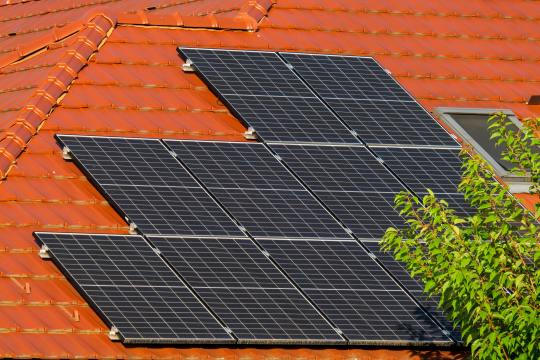
Innovative Offerings -
Rooftop solar companies in India are known for their innovative product offerings, which include high-efficiency solar panels, advanced inverters, and energy storage systems. These solutions are designed to harness the abundant solar energy available in India and provide sustainable alternatives to traditional grid-based electricity.
Quality and Reliability -
A key focus for rooftop solar companies is ensuring the quality and reliability of their products and services. From stringent manufacturing standards to rigorous testing protocols, these companies prioritize delivering solar solutions that meet industry benchmarks and customer expectations.
Customer-Centric Approach -
Rooftop solar companies in India prioritize customer satisfaction, offering personalized service and support throughout the solar journey. Whether it's assistance with system design, installation, or ongoing maintenance, these companies are committed to ensuring a seamless and positive experience for their customers.
Environmental Impact -
By promoting the adoption of rooftop solar solutions, companies in India are making significant contributions to environmental sustainability and climate change mitigation. Rooftop solar installations reduce reliance on fossil fuels, lower carbon emissions, and promote cleaner air and water for future generations.
Industry Growth and Leadership -
The rooftop solar sector in India is experiencing rapid growth, thanks to the efforts of pioneering companies. These companies play a crucial role in driving innovation, shaping industry standards, and advocating for policies that support the widespread adoption of solar energy.

In conclusion, rooftop solar companies in India are at the forefront of the nation's clean energy revolution, offering innovative, reliable, and customer-centric solutions that empower individuals, businesses, and communities to embrace renewable energy. As India continues to expand its solar footprint, these companies will play an integral role in realizing the country's vision of a sustainable and prosperous future.
0 notes
Text
Types of Solar Water Heaters: Which One Is Right for You?
In the quest for sustainable living and reducing carbon footprints, solar water heaters have emerged as an increasingly popular choice for homeowners and businesses alike. Harnessing the power of the sun to heat water, these systems offer an eco-friendly alternative to traditional water heating methods. However, with various types of solar water heaters available on the market, choosing the right one can be a daunting task. In this comprehensive guide, we'll compare different types of solar water heaters to help you determine which one is the best fit for your needs.
1. Solar Thermal Systems

Solar thermal systems, also known as solar hot water systems, are the most common type of solar water heaters. These systems use solar collectors to absorb sunlight and convert it into heat, which is then transferred to water stored in a tank. There are two main types of solar thermal systems:
a. Passive Solar Water Heaters:
- Passive solar water heaters rely on natural convection to circulate water through the system. They are relatively simple in design and typically have lower installation and maintenance costs.
- These systems are well-suited for regions with ample sunlight and moderate heating requirements. However, they may not be as efficient in colder climates or during periods of low sunlight.
b. Active Solar Water Heaters:
- Active solar water heaters use pumps or fans to circulate water through the system, increasing efficiency and control over water temperature.
- They are more complex and expensive to install compared to passive systems but offer better performance, especially in areas with varying weather conditions.
- Active systems are divided into two subtypes: direct circulation systems, where water is circulated directly through the solar collectors, and indirect circulation systems, where a heat transfer fluid is used to transfer heat to the water.
2. Solar PV Water Heaters

Solar PV (photovoltaic) water heaters combine solar panels with electric heating elements to heat water. These systems generate electricity from sunlight using PV panels, which powers the heating elements to warm the water. Here are some key points to consider:
- Solar PV water heaters are more expensive upfront compared to traditional solar thermal systems but may offer long-term savings on energy bills, especially in areas with high electricity rates.
- They are suitable for households or businesses already equipped with solar PV systems or those looking to generate electricity while heating water simultaneously.
- PV water heaters can be integrated into existing electrical water heating systems or used as standalone units, providing flexibility in installation and usage.
3. Solar Batch Heaters

Solar batch heaters, also known as batch collectors or integrated collector-storage systems, are a simple and cost-effective option for solar water heating. These systems consist of insulated tanks or containers placed in an insulated box with a glass or plastic cover to trap heat from the sun. Here are some features of solar batch heaters:
- Solar batch heaters are easy to install and maintain, making them an attractive option for DIY enthusiasts or budget-conscious consumers.
- They are most effective in warm climates with consistent sunlight but may not perform as well in colder or cloudy conditions.
- While not as efficient as active solar thermal systems, batch heaters can still provide significant energy savings and reduce reliance on conventional water heating methods.
Choosing the Right Solar Water Heater
When deciding which type of solar water heater is right for you, consider the following factors:
- Climate and sunlight availability: Determine the amount of sunlight your location receives throughout the year and whether it's sufficient to meet your water heating needs.
- Energy requirements: Evaluate your household or business's hot water usage and heating demands to determine the size and capacity of the solar water heater required.
- Budget and upfront costs: Consider your budget constraints and weigh the initial investment against long-term savings and benefits.
- Space availability and installation requirements: Assess the available space for installing solar collectors, storage tanks, and other components, as well as any structural or aesthetic considerations.
Conclusion
In conclusion, there is no one-size-fits-all solution when it comes to solar water heaters. Each type offers unique advantages and considerations depending on your location, energy requirements, budget, and space constraints. By comparing the different types of solar water heaters outlined in this guide and considering your specific needs, you can make an informed decision and choose the right system to harness the power of the sun for efficient and sustainable water heating.
0 notes
Text
The Rise of Solar Energy in Pune
In the search for ways to keep the Earth healthy and use cleaner energy, people are really interested in solar power. Solar companies all over the world are doing important work to change how we get energy. They're finding new ways to use sunlight for power, and they're also coming up with new ideas for how to run their businesses. These companies are helping to make big changes in how we get our energy.
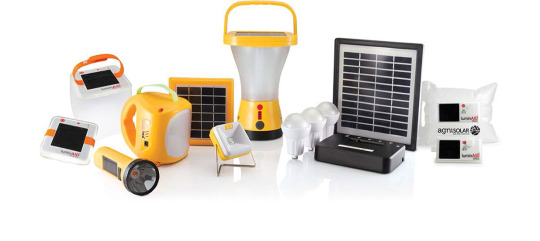
In the bustling city of Pune, amidst its vibrant culture and rapid urbanization, a quiet yet impactful revolution is taking place – the rise of solar energy. At the forefront of this movement stands AgniSolar, a pioneering solar company dedicated to harnessing the power of the sun to drive positive change in Pune and beyond.
Founded with a vision to transform Pune's energy landscape, AgniSolar has emerged as a leading player in the region's solar industry. With a strong emphasis on innovation, quality, and sustainability, the company has been instrumental in promoting the adoption of solar energy across residential, commercial, and industrial sectors.
Commitment to Cutting-Edge Solutions
One of the key pillars of AgniSolar's success lies in its commitment to technological excellence. The company invests heavily in research and development to continually enhance the efficiency and reliability of its solar solutions. From state-of-the-art solar panels to advanced energy storage systems, AgniSolar offers a comprehensive range of products tailored to meet the diverse needs of its customers.
Community Engagement for Sustainable Energy
AgniSolar's impact extends beyond just technology. The company is deeply rooted in the local community, actively engaging with stakeholders to raise awareness about the benefits of solar energy and promote sustainable practices. Through workshops, seminars, and outreach programs, AgniSolar is empowering individuals and businesses to make the switch to clean, renewable energy.
Impact on Pune's Energy
AgniSolar is a driving force behind the growth of Pune's solar ecosystem. By collaborating with local government bodies, businesses, and non-profit organizations, the company is helping to create an enabling environment for solar energy adoption. From streamlining permitting processes to facilitating financing options, AgniSolar is breaking down barriers and making solar energy more accessible to Pune's residents and businesses.

My Experience with Agni Solar
In my experience with AgniSolar, one of the top solar companies in Pune, their exceptional customer service, expertise, and passion for solar energy truly stood out. From the initial consultation to the installation process, they were professional, efficient, and respectful. The ongoing support and maintenance they provide ensure a seamless transition to solar energy, with tangible benefits such as reduced electricity bills and a reduced carbon footprint. AgniSolar's commitment to excellence and dedication to a cleaner, greener future make them an outstanding choice among solar companies in Pune for anyone considering solar energy.
One of AgniSolar's flagship projects in Pune is the installation of solar rooftop systems on commercial and industrial buildings. By harnessing unused rooftop space to generate clean energy, these installations not only reduce electricity bills but also contribute to Pune's efforts to combat climate change and reduce its carbon footprint.
Furthermore, AgniSolar is leading by example when it comes to corporate sustainability. The company has implemented a range of initiatives to minimize its own environmental impact, from energy-efficient office buildings to waste reduction programs. By walking the talk, AgniSolar is inspiring other businesses in Pune to prioritize sustainability and adopt cleaner, greener practices.
Looking ahead, AgniSolar is poised to play an even greater role in Pune's sustainable future. With ambitious plans for expansion and innovation, the company is committed to driving the adoption of solar energy to new heights. From residential neighborhoods to industrial estates, AgniSolar envisions a future where solar power is not just a choice but a way of life in Pune.
Conclusion
In conclusion, AgniSolar stands as a shining example of how solar companies are reshaping the energy landscape in Pune and beyond. With its unwavering commitment to innovation, sustainability, and community engagement, the company is paving the way towards a brighter, more sustainable future for Pune's residents and businesses alike. As the sun continues to rise on Pune's horizon, AgniSolar remains at the forefront, leading the charge towards a cleaner, greener tomorrow.
#solar panels#solar power system#solar energy#solar companies#solar system for home#solar rooftop system
0 notes
Text
Harnessing the Sun: The Importance and Benefits of Solar Water Heating Systems
In today's world, where environmental consciousness is on the rise, the adoption of sustainable energy solutions has become increasingly crucial. One such solution is solar water heating systems, which utilize the abundant and renewable energy of the sun to heat water for various purposes. Let's explore the importance and benefits of these systems:
youtube
1. Renewable Energy Source
Solar energy is a renewable resource, meaning it is inexhaustible and sustainable. By harnessing solar power for heating water, we reduce our dependence on finite fossil fuels, thereby contributing to a cleaner and greener planet.
2. Energy Efficiency
Solar water heating systems are highly energy-efficient, converting a significant portion of the sun's energy into usable heat. This efficiency helps reduce overall energy consumption and lowers utility bills, making it a cost-effective option in the long run.
3. Cost Savings
While the initial investment in a solar water heating system may be higher than conventional water heaters, the long-term savings are substantial. With lower energy bills and minimal maintenance costs, homeowners can recoup their investment over time and enjoy significant savings in the future.
4. Environmental Impact
By using solar energy instead of fossil fuels to heat water, we reduce greenhouse gas emissions and our carbon footprint. This helps combat climate change and promotes a cleaner and healthier environment for future generations.
5. Reliability
Solar energy is abundant and reliable, especially in sunny regions. Solar water heating systems can operate efficiently even on cloudy days, ensuring a continuous and reliable source of hot water for residential and commercial use.
6. Low Maintenance
Solar water heating systems are relatively low maintenance, requiring periodic checks and occasional servicing. With proper care, these systems can last for decades, providing reliable hot water for years to come.
7. Energy Independence
By installing a solar water heating system, homeowners can reduce their reliance on external sources for hot water, thus achieving a degree of energy independence. This is especially beneficial in remote areas or during power outages.
Latest updates on solar power energy:
Conclusion
Solar water heating systems offer a multitude of benefits, from cost savings to environmental protection. By harnessing the power of the sun, we can heat water efficiently, reduce our carbon footprint, and contribute to a more sustainable future. Investing in a solar water heating system is not only a wise financial decision but also a step towards a cleaner, greener planet for generations to come.
#solar power system#solar water heater#solar panels#solar heater#solar companies#solar rooftop system#solar system for home#solar energy#solar water heating system#benefits of solar system#importance of solar
0 notes
Text
Harnessing the Sun: A Comprehensive Guide to Solar Systems for Your Home
In a world where sustainability and renewable energy are at the forefront of technological advancements, harnessing the power of the sun has emerged as a promising solution. Solar systems for homes offer a gateway to cleaner, more affordable energy while reducing our carbon footprint. In this comprehensive guide, we delve into the intricacies of solar systems, exploring their benefits, components, installation process, and economic considerations.
Understanding Solar Systems:
At its core, a solar system for home consists of photovoltaic (PV) panels, an inverter, mounting hardware, and a monitoring system. These components work together to convert sunlight into electricity, which can power your home’s appliances, lighting, and other electrical devices. The process begins with sunlight hitting the PV panels, where semiconductor materials such as silicon absorb the photons and generate a flow of electrons, creating an electric current. The inverter then converts this direct current (DC) into alternating current (AC), which is compatible with your home’s electrical system.
Benefits of Solar Systems:
youtube
Cost Savings: By generating your own electricity, you can significantly reduce or eliminate your monthly utility bills, providing long-term savings on energy costs.
Environmental Impact: Solar energy is clean and renewable, producing no greenhouse gas emissions or pollutants during operation, thus mitigating climate change and reducing dependence on fossil fuels.
Energy Independence: With a solar system in place, you become less reliant on the grid, providing resilience against power outages and fluctuations in energy prices.
Increased Property Value: Homes equipped with solar systems often have higher resale values and appeal to eco-conscious buyers.
Government Incentives: Many governments offer incentives such as tax credits, rebates, and net metering programs to encourage the adoption of solar energy, further enhancing its affordability.
Components of a Solar System:
PV Panels: These are the heart of the system, comprised of multiple solar cells that convert sunlight into electricity.
Inverter: Converts the DC electricity generated by the panels into AC electricity suitable for household use.
Mounting Hardware: Secures the panels to the roof or ground, ensuring optimal orientation and angle for maximum sunlight exposure.
Monitoring System: Allows homeowners to track the performance of their solar system in real-time, monitoring energy production and identifying any issues promptly.
Installation Process:
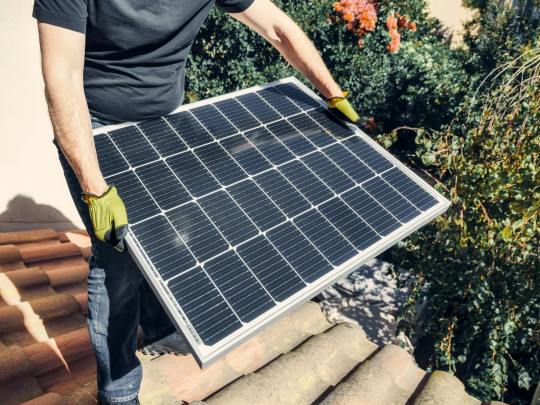
Site Assessment: A professional installer evaluates your property to determine its suitability for solar installation, considering factors such as roof orientation, shading, and structural integrity.
Design and Permitting: Based on the site assessment, a customized solar system design is created, taking into account your energy needs and aesthetic preferences. The necessary permits are then obtained from local authorities.
Installation: The PV panels, inverter, and mounting hardware are installed according to the approved design, typically taking a few days to complete.
Connection to the Grid: Once the system is installed, it is connected to the electrical grid through a process called interconnection, allowing for the seamless exchange of electricity between your home and the grid.
Commissioning and Testing: The system undergoes thorough testing and commissioning to ensure it is functioning optimally and safely.
Monitoring and Maintenance: After installation, regular monitoring and maintenance are essential to ensure the continued performance and longevity of the solar system.
Economic Considerations:
While the upfront cost of installing a solar system for your home can be significant, it is essential to consider the long-term financial benefits. Factors to consider include:
Return on Investment (ROI): Calculating the payback period by comparing the upfront cost of the system to the savings on energy bills over its lifespan.
Financing Options: Exploring financing options such as solar loans, leases, or power purchase agreements (PPAs) to make solar more accessible with little to no upfront cost.
Tax Incentives and Rebates: Taking advantage of available incentives such as federal tax credits, state rebates, and utility incentives to reduce the cost of installation.
Net Metering: Leveraging net metering programs to receive credits for excess energy generated by your solar system, further reducing your electricity costs.
Conclusion:
Solar systems for homes represent a transformative solution to the pressing challenges of climate change and energy sustainability. By harnessing the power of the sun, homeowners can enjoy cost savings, environmental benefits, and energy independence. With advancements in technology and supportive government policies, solar energy is becoming increasingly accessible and affordable for households worldwide. Embracing solar power is not just an investment in a brighter future but a commitment to a cleaner, greener planet for generations to come.
#solar energy#solar power system#solar rooftop system#solar installation#solar consumption#solar panels#Youtube
1 note
·
View note
Text
Shedding Light on Solar Power: Disadvantages and Solutions
Solar power has emerged as a promising renewable energy source, utilizing the sun's abundant energy to generate electricity. While solar energy offers numerous benefits, it's essential to understand its disadvantages and explore potential solutions.
Let's delve into the challenges associated with solar power and how they can be addressed.
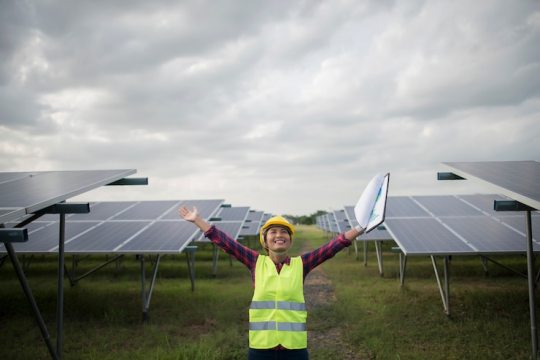
Understanding Solar Power
Solar power involves converting sunlight into electricity using photovoltaic (PV) cells or solar panels that are used in solar water heaters. It's a clean and renewable energy source that produces no greenhouse gas emissions, making it an environmentally friendly alternative to fossil fuels.
Disadvantages of Solar Power
Intermittency
One significant drawback of solar power is its intermittent nature. Solar energy generation is dependent on sunlight, meaning it's unavailable at night or during cloudy weather, resulting in fluctuations in power output.
Energy Storage Challenges
Another challenge is the storage of solar energy for use when sunlight is unavailable. Current battery technologies for storing solar energy are expensive and have limited capacity, making energy storage a significant hurdle for widespread adoption.
Space Requirements
Solar power systems require ample space for installation, especially for large-scale solar farms. This can be impractical in densely populated areas or locations with limited available land.
High Initial Costs
While solar energy offers long-term cost savings, the initial investment for installing solar panels can be high. The upfront costs of purchasing and installing solar panels may deter some homeowners and businesses from adopting solar power.
youtube
Source: YouTube: (GreenPowerEnergy)
Solutions to Overcome Challenges
Energy Storage Solutions
Advances in battery technology are addressing the challenge of energy storage for solar power systems. Lithium-ion batteries and other emerging storage technologies are becoming more efficient and affordable, enabling better integration of solar energy into the grid.
Hybrid Systems
Combining solar power with other renewable energy sources such as wind or hydroelectric power can help mitigate the intermittency of solar energy. Hybrid systems provide a more consistent power supply by leveraging multiple energy sources.
Efficiency Improvements
Ongoing research and development efforts focus on improving the efficiency of solar panels and optimizing their performance in varying weather conditions. Innovations such as bifacial solar panels and solar tracking systems enhance energy capture and yield.
Government Incentives and Policies
Governments can incentivize the adoption of solar power through subsidies, tax credits, and feed-in tariffs. Implementing supportive policies and regulations can make solar energy more accessible and financially viable for homeowners and businesses.
Conclusion
While solar power offers a clean and sustainable energy solution, it's essential to address its disadvantages to realize its full potential.
By overcoming challenges such as intermittency, energy storage limitations, space requirements, and initial costs through technological advancements, hybrid systems, efficiency improvements, and supportive policies, we can accelerate the transition to a renewable energy future powered by the sun.
With continued innovation and investment, solar power can play a pivotal role in combating climate change and ensuring a greener, more sustainable planet for future generations.
0 notes
Text
Heating Your Home: The Science Behind Solar Water Systems
Heating your home efficiently and sustainably is a goal for many homeowners. One solution gaining popularity is solar water heating systems. But how do they work, and are they worth investing in?
In this article, we'll delve into the science behind solar water systems, explaining how they function and the benefits they offer for heating your home.

How Solar Water Systems Work
Solar water heating systems harness the power of sunlight to heat water for residential use. The basic components of a solar water system include:
Solar Collectors
These panels, typically installed on the roof, absorb sunlight and convert it into heat. There are two main types of solar collectors: flat-plate collectors and evacuated tube collectors.
Heat Transfer Fluid
A heat transfer fluid, often a mixture of water and antifreeze, flows through the solar collectors, absorbing heat from the sunlight.
Heat Exchanger
The heat transfer fluid then passes through a heat exchanger, where it transfers its heat to water stored in a storage tank.
Storage Tank
The heated water is stored in a well-insulated storage tank until it's needed for domestic use, such as bathing, washing dishes, or heating the home.
youtube
Source: YouTube: (SunbankSolar)
Benefits of Solar Water Systems
Now that we understand how solar water heating systems work, let's explore the benefits they offer for heating your home:
Renewable Energy Source
Solar energy is abundant, renewable, and environmentally friendly. By harnessing the power of sunlight, solar water systems reduce reliance on fossil fuels and lower carbon emissions.
Cost Savings
While the initial investment in a solar water system may be higher than traditional heating systems, homeowners can save money in the long run on energy bills. Solar energy is free once the system is installed, helping to offset utility costs over time.
Energy Independence
Solar water systems provide homeowners with greater energy independence by generating their own heat from sunlight. This reduces vulnerability to fluctuations in energy prices and supply disruptions.
Low Maintenance
Solar water systems are relatively low maintenance compared to traditional heating systems. With proper installation and periodic inspections, they can provide reliable hot water for many years.
Considerations Before Installing
Before investing in a solar water system for heating your home, there are a few considerations to keep in mind:
Sunlight Availability
The efficiency of a solar water system depends on the amount of sunlight available at your location. Consider factors such as the orientation and tilt of your roof, shading from trees or buildings, and local climate conditions.
Space Requirements
Solar collectors require adequate space for installation on the roof or in the yard. Ensure you have sufficient space and that your roof can support the weight of the panels.
Upfront Costs
While solar water systems offer long-term savings, they require an initial investment for installation. Consider your budget and explore financing options, incentives, and rebates available for solar energy systems.
Conclusion
Solar water systems offer a sustainable, cost-effective, and efficient solution for heating your home. By harnessing the power of sunlight, these systems provide renewable energy for heating water while reducing reliance on fossil fuels and lowering utility bills.
Before investing in a solar water system, consider factors such as sunlight availability, space requirements, and upfront costs. With proper planning and installation, solar water systems can provide reliable hot water and contribute to a greener, more sustainable future for your home.
0 notes
Text
Sun-Powered Comfort: Your Comprehensive Solar Water Heater Handbook
Utilising the power of the sun to heat water is not only eco-friendly but also cost-effective. In this comprehensive solar water heater handbook, we'll walk you through everything you need to know about solar water heaters, from how they work to their benefits and installation process.
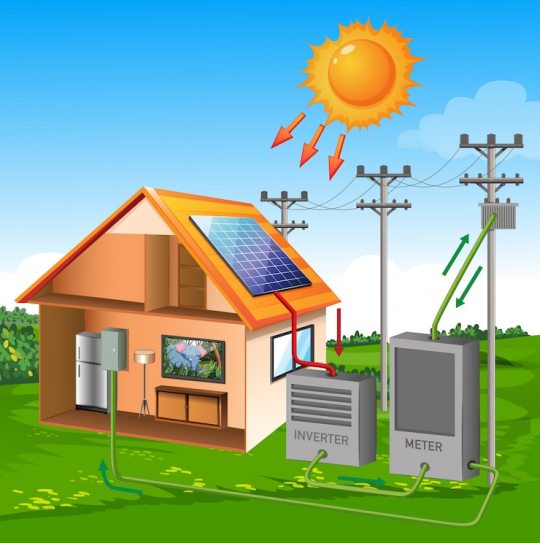
Understanding Solar Water Heaters
Solar water heaters utilize sunlight to heat water for various purposes, including bathing, washing dishes, and space heating. These systems consist of solar collectors, storage tanks, and a circulation system.
The solar collectors, typically mounted on the roof, absorb sunlight and transfer the heat to the water circulating through them. The heated water is then stored in a well-insulated tank for later use.
Types of Solar Water Heaters
There are two main types of solar water heaters:
Active Solar Water Heaters
These systems use pumps or other circulation devices to move water from the collector to the storage tank. Active solar water heaters are suitable for areas with cold climates or where the collector cannot be installed directly above the storage tank.
Passive Solar Water Heaters
Passive systems rely on natural convection to circulate water between the collector and the storage tank. These systems are simpler and more cost-effective but may be less efficient in colder climates.
Benefits of Solar Water Heaters
Investing in a solar water heater offers numerous benefits:
Lower Energy Bills
By utilising free solar energy, solar water heaters can significantly reduce your electricity or gas bills, saving you money in the long run.
Environmentally Friendly
Solar water heaters produce clean, renewable energy, reducing your carbon footprint and helping combat climate change.
Reliability
Solar energy is abundant and reliable, ensuring a steady supply of hot water even during power outages or fuel shortages.
Long-Term Savings
While the initial investment in a solar water heater may be higher than traditional water heating systems, the long-term savings on energy bills outweigh the upfront costs.
youtube
Source: YouTube: (Galaxy Builders, Inc)
Installation and Maintenance
Installing a solar water heater requires careful planning and professional expertise. Here's what you need to know:
Site Assessment
Before installation, a site assessment is conducted to determine the optimal location for the solar collectors and storage tank, ensuring maximum sunlight exposure.
Installation Process
The installation process involves mounting the solar collectors on the roof, connecting them to the storage tank, and installing the circulation system and controls.
Maintenance
Solar water heaters require minimal maintenance, mainly consisting of periodic inspections, cleaning of the collectors, and checking for leaks or malfunctions.
Conclusion
Solar water heaters offer an eco-friendly, cost-effective solution for heating water using the power of the sun. Understanding how these systems work, their benefits, and the installation process is essential for making an informed decision about incorporating solar energy into your home. With proper installation and maintenance, a solar water heater can provide years of sun-powered comfort while reducing your carbon footprint and energy bills.
0 notes
Text
Solar Water Heating: Sustainable Solutions for Water Heating
Solar water heating systems have emerged as a sustainable and cost-effective alternative to traditional water heating methods. In this article, we explore the benefits, working principles, and practical considerations of solar water heating, offering insights into why it's becoming increasingly popular as a green energy solution.
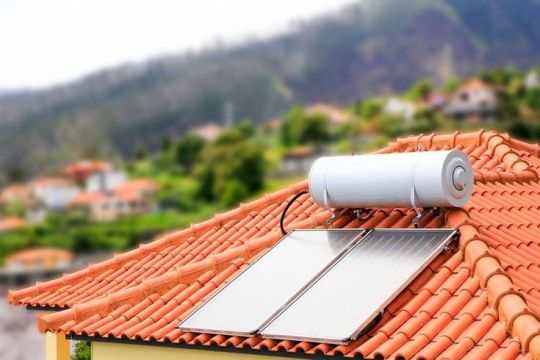
Understanding Solar Water Heating
Solar water heating harnesses the power of sunlight to heat water for residential, commercial, and industrial use. Unlike photovoltaic (PV) solar panels that generate electricity, solar water heaters directly heat water using solar thermal collectors. These collectors absorb sunlight and transfer the heat to a fluid (typically water or a heat transfer fluid) that circulates through the system.
How Solar Water Heating Works
Solar Collectors
A Solar water heating unit consists of solar collectors installed on rooftops or other suitable locations where they can receive maximum sunlight exposure. These collectors are usually made of flat-plate or evacuated tube designs, both of which effectively capture solar energy.
Heat Transfer
Within the solar collectors, a heat transfer fluid (such as antifreeze solution or water) absorbs the solar radiation and becomes heated. This hot fluid is then circulated through pipes or tubes to a storage tank or heat exchanger.
Storage Tank
The heated fluid transfers its thermal energy to the water stored in the tank, raising its temperature. Solar water heating systems are often equipped with backup heating elements (such as electric or gas heaters) to ensure hot water availability during periods of low sunlight or high demand.
Distribution
Once the water reaches the desired temperature, it is ready for distribution to faucets, showers, or other hot water outlets throughout the building. Solar water heating systems can be integrated with existing plumbing infrastructure or installed as standalone systems, depending on the specific requirements.
youtube
Source: YouTube: (TutorVista)
Benefits of Solar Water Heating
Energy Efficiency
Solar water heating systems utilize renewable solar energy, reducing reliance on fossil fuels and lowering carbon emissions. By harnessing free sunlight, these systems offer a clean and sustainable solution for heating water.
Cost Savings
While the initial investment in solar water heating may be higher than conventional water heating systems, the long-term savings on energy bills can be substantial. Solar water heaters have lower operating costs and require minimal maintenance, resulting in significant financial benefits over their lifespan.
Environmental Impact
By reducing energy consumption and greenhouse gas emissions, solar water heating contributes to environmental conservation and mitigates climate change. Switching to solar energy helps to conserve natural resources and protect the planet for future generations.
Reliability
Solar energy is abundant and reliable, especially in sunny regions with consistent sunlight throughout the year. Solar water heating systems can provide a steady supply of hot water even during periods of inclement weather, thanks to effective storage and backup mechanisms.
Conclusion
Solar water heating offers a sustainable, cost-effective, and environmentally friendly solution for meeting hot water needs in residential, commercial, and industrial settings. By harnessing the power of sunlight, these systems provide reliable hot water while reducing energy costs and carbon emissions.
As awareness of climate change and environmental sustainability grows, solar water heating is expected to play an increasingly important role in transitioning towards a cleaner and greener future.
#solar energy#solar system for home#solar rooftop system#solar heater#solar panels#solar water heater#Youtube
0 notes
Text
Heating Up: Sun-Powered Water Systems for Your Home
As concerns about sustainability and energy efficiency continue to grow, more homeowners are turning to sun-powered water systems as a greener alternative for heating water in their homes. In this article, we'll explore what sun-powered water systems are, how they work, their benefits, and considerations for installation.
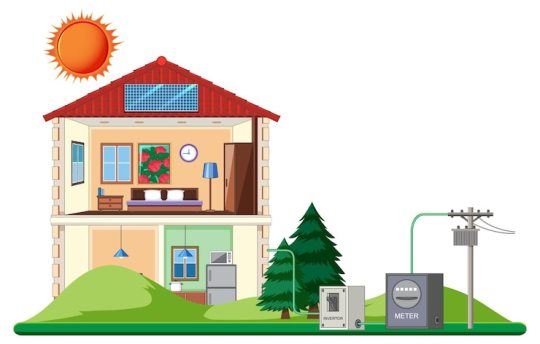
What are Sun-Powered Water Systems?
Sun-powered water heating systems, also known as solar water heaters, use solar energy to heat water for residential use. These systems typically consist of solar collectors, a storage tank, and a circulating pump. Solar collectors, usually mounted on the roof or in an open area with ample sunlight exposure, absorb heat from the sun and transfer it to the water flowing through them.
How Do They Work?
Solar water heaters work on a simple principle: sunlight heats a fluid (usually water or a heat-transfer fluid) in the solar collectors, which then transfers the heat to the water stored in the tank. This heated water can be used for various purposes, such as bathing, laundry, and dishwashing. In some systems, a circulating pump helps move the water through the collectors and into the storage tank, ensuring efficient heating.
Benefits of Sun-Powered Water Systems
Energy Savings: By harnessing the free and abundant energy of the sun, solar water heaters can significantly reduce your reliance on traditional energy sources, leading to lower utility bills and long-term savings.
Environmental Benefits: Solar water heaters produce no greenhouse gas emissions or air pollutants, making them a cleaner and more sustainable option compared to conventional water heating systems.
Reliable Performance: Solar water heaters are designed to operate efficiently even on cloudy days or during periods of low sunlight, ensuring a reliable supply of hot water throughout the year.
Long-Term Investment: While the upfront cost of installing a solar water heater may be higher than traditional water heaters, the long-term savings on energy bills and potential incentives can make it a worthwhile investment for homeowners.
Increased Property Value: Homes equipped with solar water heating systems often have higher resale values and may attract eco-conscious buyers, making it a valuable addition to your property.
youtube
Source: YouTube: (Home Tube)
Considerations for Installation
Sun Exposure: To maximize the efficiency of a solar water heater, it's essential to install it in an area with ample sunlight exposure throughout the day, typically facing south or southwest.
Roof Condition: Before installation, assess the condition of your roof to ensure it can support the weight of the solar collectors and storage tank. Any necessary repairs or reinforcements should be addressed beforehand.
System Size: Determine your household's hot water needs and choose a system size that can adequately meet those requirements. Consider factors such as the number of occupants, daily water usage, and climate conditions.
Local Regulations: Check local building codes and regulations regarding the installation of solar water heaters, including permit requirements and zoning restrictions.
Conclusion
Sun-powered water systems offer an environmentally friendly and cost-effective solution for heating water in your home. By harnessing the power of the sun, these systems can help you reduce energy costs, lower your carbon footprint, and enjoy reliable hot water year-round. Consider installing a solar water heater today and take a step towards a more sustainable future for your home.
#solar water heater#solar power system#Solar Water Heating System#solar system for home#solar power#Youtube
0 notes
Text
India-based Solar Energy Companies: A Complete Guide
In the quest for sustainable and eco-friendly energy solutions, solar power has emerged as a frontrunner. India, with its abundant sunlight, has witnessed a surge in the adoption of solar energy.
This article serves as a comprehensive guide to India-based solar energy companies, shedding light on their role in the renewable energy landscape.

The Rise of Solar Energy in India
India's Solar Potential
India, blessed with ample sunlight throughout the year, has become a key player in the global solar energy market. The government's initiatives and incentives have fueled the growth of solar power projects across the country.
The Shift towards Sustainable Energy
As the world embraces sustainability, more businesses and households in India are turning to solar energy to reduce their carbon footprint. Solar power not only helps in curbing environmental impact but also offers long-term cost savings.
India-based Solar Energy Companies Overview
Diverse Players in the Market
India boasts a vibrant solar energy sector with numerous companies contributing to its growth. These companies vary in size, expertise, and the services they offer, providing consumers with a range of options to choose from.
Aditya Solar: A Spotlight
Introduction to Aditya Solar
As the sun rises on India's renewable energy frontier, Aditya Solar emerges as a key player in the solar energy sector. Established with a vision to revolutionize India's energy landscape, Aditya Solar has been at the forefront of harnessing solar power since its inception.
Core Offerings
Aditya Solar prides itself on a diverse portfolio of solar solutions catering to various sectors. From residential to commercial applications, the company offers solar panels, solar water heaters, solar street lights, and customized solar power plants. Their commitment extends beyond product sales, providing end-to-end solar solutions tailored to the unique needs of each client.
Active Engagement
Aditya Solar actively engages with local communities, spreading awareness about the benefits of solar energy. Through educational initiatives, workshops, and community projects, the company strives to create a solar-aware society.
youtube
Source: YouTube: (Agni Solar)
Agni Solar: A Spotlight
Introduction to Agni Solar
Another prominent player in the Indian solar energy landscape is Agni Solar. Established in 1993, this India-based solar energy company has been a pioneer in harnessing solar energy for diverse applications. The company is renowned for its commitment to quality, innovation, and sustainability.
Core Offerings
Agni Solar provides a comprehensive range of solar solutions, catering to both residential and commercial needs. Their offerings include solar water heaters, rooftop solar panels, solar street lights, and solar power plants.
Commitment to Quality
Agni Solar places a strong emphasis on the quality of its products. The company follows stringent quality control measures to ensure that each solar solution meets international standards. This commitment has earned them trust and recognition in the industry.
Conclusion
As India accelerates its transition towards clean and sustainable energy, the role of solar energy companies becomes increasingly pivotal. Agni Solar, with its rich history, commitment to quality, and customer-focused approach, exemplifies the values that drive the success of India-based solar energy companies.
For those considering a shift to solar power, exploring reputable companies like Agni Solar can be a significant step towards a greener and more sustainable future.
0 notes
Text
Residential Solar Energy System: Why is it required?
In a world where sustainability is gaining importance, residential solar energy systems have become a noteworthy solution for homeowners. But why exactly is having a residential solar energy system necessary? Let's break it down in simple terms to understand the reasons behind its growing importance.
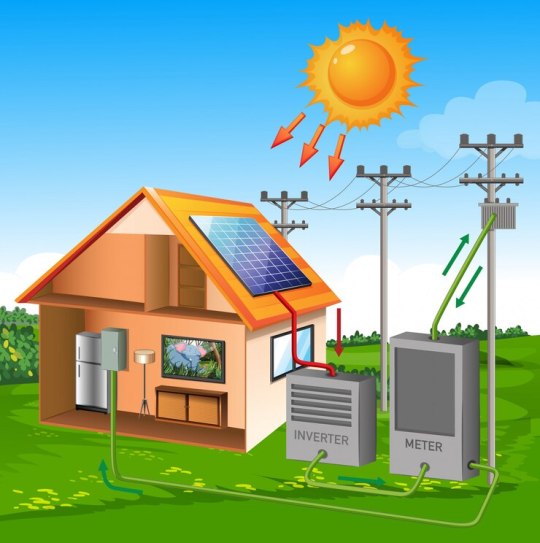
Clean and Green Energy
One of the primary reasons for having a residential solar energy system is to contribute to a cleaner environment. Solar energy is renewable and doesn't produce harmful emissions, making it a greener choice compared to conventional electricity generated from fossil fuels.
Cost Savings
Investing in a residential solar energy system can lead to substantial cost savings. While the initial installation may require an investment, solar panels generate electricity from sunlight, cutting down your reliance on grid power and resulting in lower monthly electricity bills over time.
Energy Independence
Having a residential solar energy system grants a level of energy independence. Homeowners are less reliant on external power sources, which is especially beneficial during power outages or times of high demand on the grid. This independence adds a layer of reliability to your energy supply.
Government Incentives
Many governments provide incentives to encourage the adoption of solar energy. These incentives may include tax credits, rebates, or favorable financing options. Taking advantage of these programs can significantly reduce the overall cost of installing a residential solar energy system.
youtube
Source: YouTube: (Rainier Solar)
Increased Property Value
A home equipped with a residential solar energy system is often more attractive to potential buyers. The system's ability to generate clean energy and reduce electricity bills can be a significant selling point, potentially increasing the overall value of your property.
Low Maintenance
Residential solar energy systems are known for their low maintenance requirements. Once installed, they typically need little attention. Regular cleaning and occasional checks by professionals ensure optimal performance, making them a hassle-free and convenient option for homeowners.
Long-Term Investment
A residential solar energy system is a long-term investment that pays off over the years. Solar panels have a lifespan of 25 years or more, providing a reliable and durable energy solution. The longevity of these systems makes them a sound investment for homeowners looking for a sustainable energy source.
Conclusion
A residential solar energy system is required for various reasons, ranging from environmental sustainability to long-term cost savings. With the added benefits of government incentives, increased property value, energy independence, and low maintenance, adopting solar energy for your home not only makes sense for the planet but also for your wallet.
As technology advances and solar energy becomes more accessible, the adoption of residential solar systems is likely to continue growing as homeowners seek a cleaner, more sustainable future.
0 notes
Text
Solar Hot Water System: A Sustainable Solution
In the pursuit of sustainable living, the solar hot water system stands out as an eco-friendly solution to meet our daily comfort needs. This article explores what a solar hot water system is, how it works, and why it's becoming a popular choice for those looking to reduce their carbon footprint.

Understanding Solar Hot Water Systems: The Basics
A solar hot water system is designed to capture and utilize the sun's energy to heat water for various domestic purposes. Unlike traditional water heaters that rely on electricity or gas, solar hot water systems provide a greener alternative by using sunlight as the primary energy source.
How It Works: The Mechanics Simplified
Solar Collectors: Absorbing Sunlight
At the heart of a solar hot water system are solar collectors, usually mounted on rooftops. These collectors absorb sunlight and convert it into heat. The most common types of solar collectors are flat-plate collectors and evacuated tube collectors, both efficient in capturing solar energy.
Transfer of Heat to Water
Once the collectors capture solar energy, a heat transfer system moves this energy to the water. This process can involve either a direct or indirect circulation system. In a direct system, water circulates through the collectors and into the home. In an indirect system, a heat transfer fluid carries the heat to a heat exchanger, where it warms the water used in the household.
Key Components: What Makes Up a Solar Hot Water System
Solar Collectors
As mentioned earlier, solar collectors are the essential components responsible for absorbing sunlight. They come in different shapes and sizes but all share the purpose of converting solar energy into heat.
Storage Tank
A storage tank is where the heated water is stored for later use. These tanks are well-insulated to preserve the warmth of the water, ensuring a constant supply of hot water even during cloudy days.
Backup Heating System
To provide hot water in case of prolonged cloudy days or increased demand, many solar hot water systems come equipped with a backup heating system. This can be an electric or gas water heater that kicks in when solar energy alone is insufficient.
youtube
Source: YouTube: (HOME TUBE)
Advantages: Why Choose a Solar Hot Water System?
Reduced Energy Bills
One of the significant advantages of a solar hot water system is the potential for substantial energy savings. By relying on the sun's free and abundant energy, homeowners can cut down on traditional energy consumption, leading to lower utility bills.
Environmentally Friendly
Using solar energy reduces reliance on fossil fuels, contributing to a decrease in carbon emissions. This environmentally friendly approach aligns with global efforts to combat climate change and create a more sustainable future.
Considerations and Installation: What You Need to Know
Sunlight Availability
Before installing a solar hot water system, it's crucial to assess the amount of sunlight your location receives. While these systems can still work on cloudy days, optimal performance depends on ample sunlight exposure.
Professional Installation
For a seamless transition to solar hot water, professional installation is recommended. Certified technicians ensure that the system is installed correctly, maximizing its efficiency and lifespan.
Conclusion
A solar hot water system offers a practical and eco-friendly solution for those seeking to reduce their environmental impact while enjoying the comforts of daily life. With its straightforward mechanics, energy savings, and positive contribution to the environment, embracing a solar hot water system is a step towards sustainable living that benefits both homeowners and the planet.
0 notes
Text
Solar Energy Firms: The Key to a Greener Future
In the quest for a sustainable and eco-friendly future, solar energy firms have emerged as key players. These companies are not just about installing solar panels; they are catalysts for a greener world. Let's delve into how solar energy firms work towards a sustainable future and why they play a crucial role in shaping our environmental destiny.

Harnessing the Power of the Sun
At the heart of solar energy firms' mission is the utilization of sunlight to generate clean and renewable energy. Solar panels, made of photovoltaic cells, capture sunlight and convert it into electricity. This process is not only efficient but also produces zero emissions, contributing significantly to reducing our carbon footprint.
Promoting Clean Energy Adoption
One of the primary objectives of solar energy firms is to promote the adoption of clean energy solutions. They work with residential, commercial, and industrial clients to transition from conventional energy sources to solar power. By installing solar panels on rooftops or in open spaces, these firms empower individuals and businesses to generate their own clean energy.
Grid-Connected Solar Systems
Solar energy firms often integrate their installations with the existing power grid. Excess energy generated by solar panels can be fed back into the grid, allowing users to earn credits or compensation. This not only makes solar energy more accessible but also contributes to the overall stability of the energy grid.
Off-Grid Solutions for Remote Areas
In addition to grid-connected systems, solar energy firms play a crucial role in providing energy solutions to remote and off-grid areas. By installing solar power systems in these locations, they bring electricity to places that might not have had access before. This not only improves living conditions but also reduces dependence on non-renewable energy sources.
youtube
Source: YouTube: (SunPower)
Energy Efficiency and Cost Savings
Solar energy firms focus on making solar solutions not only environmentally friendly but also economically viable. With advancements in technology and economies of scale, the cost of solar panels has significantly decreased. This, coupled with government incentives and tax credits, makes solar energy an attractive and cost-effective option for many.
Educating and Raising Awareness
Beyond installations, solar energy firms play a vital role in educating the public about the benefits of solar power. They conduct awareness campaigns, provide information about government incentives, and offer guidance on making the switch to solar energy. By empowering individuals with knowledge, these firms contribute to a broader movement towards sustainability.
FAQs
Are Solar Panels Expensive?
While the initial cost of solar panels can be an investment, the long-term savings on energy bills and available incentives often make them a cost-effective choice.
How Long Do Solar Panels Last?
Solar panels can last for 25-30 years or more with proper maintenance. They typically come with warranties that guarantee optimal performance for a specified period.
Can Solar Energy Work During Cloudy Days?
Yes, solar panels can generate energy on cloudy days, although their efficiency may be lower compared to sunny days. They still contribute to energy production even in less-than-ideal weather conditions.
Conclusion
Solar energy firms are at the forefront of creating a greener future by harnessing the power of the sun. Their efforts go beyond installing solar panels; they encompass promoting clean energy adoption, providing solutions for both grid-connected and off-grid scenarios, and educating the public about the benefits of solar power.
As we look towards a sustainable future, the role of solar energy firms becomes increasingly crucial in shaping an environmentally conscious world. They are not just companies; they are the architects of a cleaner and brighter tomorrow.
0 notes